Listening and learning: 6 to 12 months
During these months your baby will start to listen more carefully. They'll love it when you take the time to chat, play and read with them.
Every little thing you do together, whether that's at bedtime or lunchtime, will help to improve their confidence and communication.
Video: Sharing stories with your baby
Watch a mum reading a story to her baby, engaging them with books. Her baby touches the shapes and textures in the books.
Activities for your daily routine
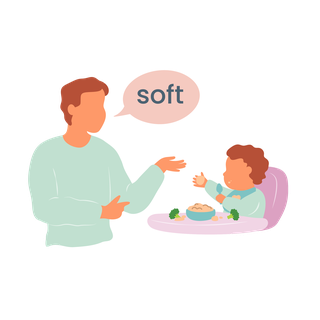
Mealtimes
When you feed your baby, talk to them and use simple words to describe it. Repeat the name of the food, for example, "here’s a banana, baby's eating a banana", or "yummy banana!".
Your baby is learning to connect the words you use with the food they are eating.
When you eat together, they also see the joy on your face as you enjoy the food.
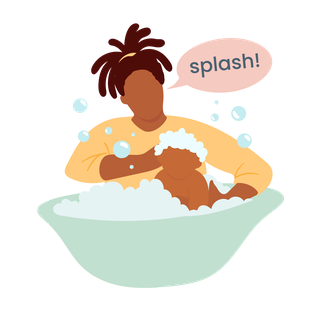
Bath time
Bath time can be a really fun step in your daily routine but it's also a great opportunity to build your baby's brain!
When you’re washing them, tell them what part of their body you’re washing. When they’re splashing, mimic the sound of splashing water by saying "splish, splash, splosh" in different pitches.
Keep some toys and waterproof books near the bath. You can name the toys as your baby plays with them, for example, "duck, the duck's wet" or "duck says quack".
Let your baby respond to you
Encourage your baby to play with you by taking turns. You might splash the water and say "splash, splash," then wait to see if they copy you. If they don’t, that’s okay — they’re still having fun playing with you and hearing new words!
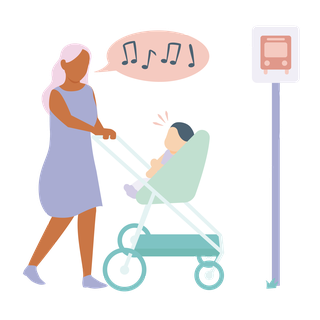
Out and about
You can talk with your baby whenever you’re out and about.
Talk to them about what you see and mention what your baby is looking at. For example, say, "Look! There’s a dog, woof woof" or "The bus goes brmm, brmm".
If your baby starts to copy you, encourage them and repeat what they say.
Use gestures to help your baby understand
Try adding gestures by moving your hands when you talk. For example, wave as you say "hello" or "goodbye".
Using gestures will help your baby understand better, and they might even start copying you before they use the words!
Video: Talk when you're out and about
Watch how a mum interacts with her baby when they go out for a walk. Mum chats to her baby about what she sees and responds to the sounds her baby makes.
Tiny Happy People
The BBC’s Tiny Happy People website offers simple, expert-backed ideas and activities to support your child’s language and communication skills from pregnancy through their early years.
The tips are easy to add to your daily routine, quick, inspiring, and proven to help your child thrive.
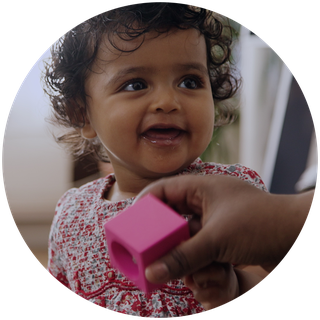
Little tips for everyday play
Libraries are a free way to access age appropriate books. Some also run story time sessions for parents and their children. Find your local library service on gov.uk.
Your local council may offer activities too. Find learning activities for your child on gov.uk.
Family Hubs
Family Hubs offer support to children, young people and their families. They provide a single place to go for support and information from a variety of organisations, making it easier to get the support you need.
They can provide guidance on issues such as feeding your baby or toddler, mental health and parenting support.
Family Hubs are currently operating in 75 local authorities across England.
Learning more than 1 language
It's important to chat with your child in the language or languages you speak at home. For tips on how to do this, check out the National Literacy Trust website.
Help and advice
At about 12 months, your health visitor will talk to you about your baby's development. They will let you know if your baby needs a little extra support. They may also suggest local activities.
Ask your health visiting team for support whenever you need it, they will be able to provide tips and advice.
Remember, children learn to talk at different ages. If you are worried, speak to your health visitor or nursery key worker, or contact your local speech and language therapy service for advice.
For more ideas on how you can help your child, visit:
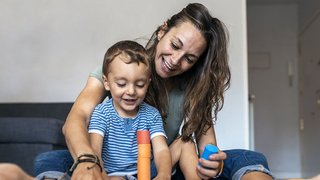
Early learning and development
90% of your child's brain growth takes place before they turn 5. Discover more advice and activities for ages 0 to 5 to help you make the most of every moment.
